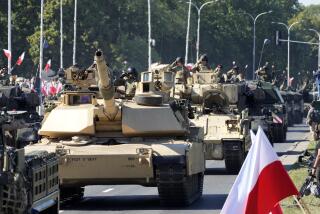Raise Defense Budgets, U.S. Urges Allies : Administration Says Europe, Japan Can Afford to Spend More
- Share via
WASHINGTON — The Reagan Administration today urged U.S. allies in Europe and Asia to boost their contribution to mutual defense.
“The European countries, Japan as well, can afford to invest more in their defense programs than they are doing today. They should do this, the requirement is there, the ability to pay is there. That is the bottom line of the report,” said Deputy Defense Secretary William Howard Taft IV.
“We have . . . unmet security needs and we have allies who in terms of their prosperity can afford to do more to meet those and they should do that,” Taft told a news conference at which he presented a report signed by Defense Secretary Frank C. Carlucci and Secretary of State George P. Shultz.
Taft said domestic political considerations have kept a number of U.S. allies from increasing their defense spending and he praised the process of consultation and negotiation that he said has bolstered the security budgets of several key nations.
‘Halt to Downward Trend’
Japan and Korea have increased their defense spending, he said, and “we have also seen in Europe a halt to what had been a downward trend in (Britain) and in West Germany. . . . “
But as other nations assume a greater share of the burden, he said, the United States does not plan to cut its defense spending.
“Our view is, and we have been emphatic about this throughout the discussion, is that the United States needs to do at least as much as it is doing, that it can afford to do what it is doing,” he said.
Among the 15 members of the North Atlantic Treaty Organization, the report identified five that it said are not meeting the goal of spending 3% of gross national product a year on defense: Canada, Denmark, Italy, Luxembourg and Spain.
Japan’s Efforts Increase
It said that Canada and Luxembourg are not meeting the NATO norm in terms of active duty and reserve military personnel and that Belgium, Denmark, Luxembourg and Norway are not meeting their force goal commitments for NATO.
In East Asia, Taft said, “the Japanese have continued their efforts to increase their defense program, as they have been doing for the last decade. We certainly hope they will continue to do that.”
“The withdrawal of (U.S.) troops (from Korea) is not being considered,” he said. “We think that the numbers of troops that we have there are appropriate to that task” of defending South Korea. “The Korean contribution could be increased, is being increased, and we welcome that and we support it.”
The report echoed the findings of a statement issued Dec. 1 by NATO defense ministers that cited “significant differences between individual national contributions.”
It said several countries are allowing a decline in the percentage of money they devote to defense compared with gross domestic product.
More to Read
Get the L.A. Times Politics newsletter
Deeply reported insights into legislation, politics and policy from Sacramento, Washington and beyond. In your inbox twice per week.
You may occasionally receive promotional content from the Los Angeles Times.








